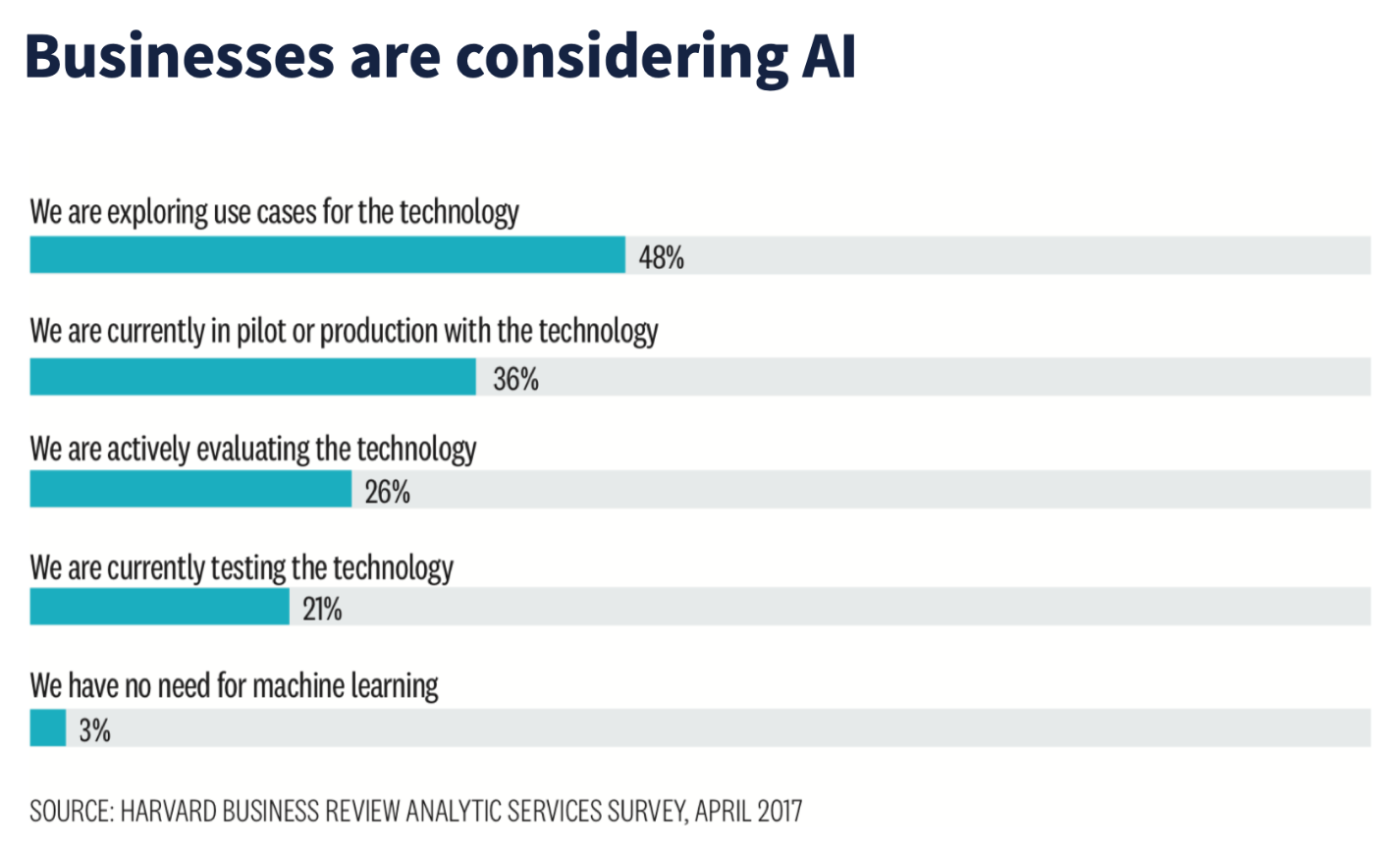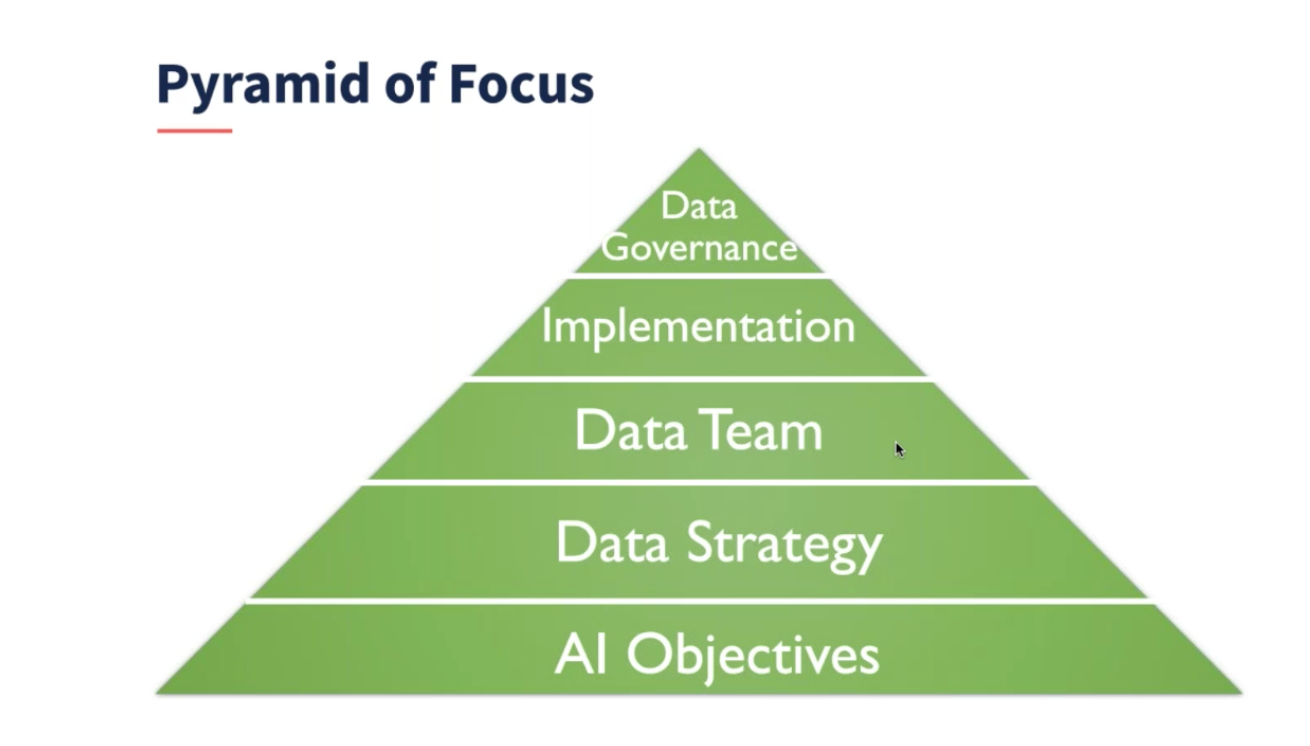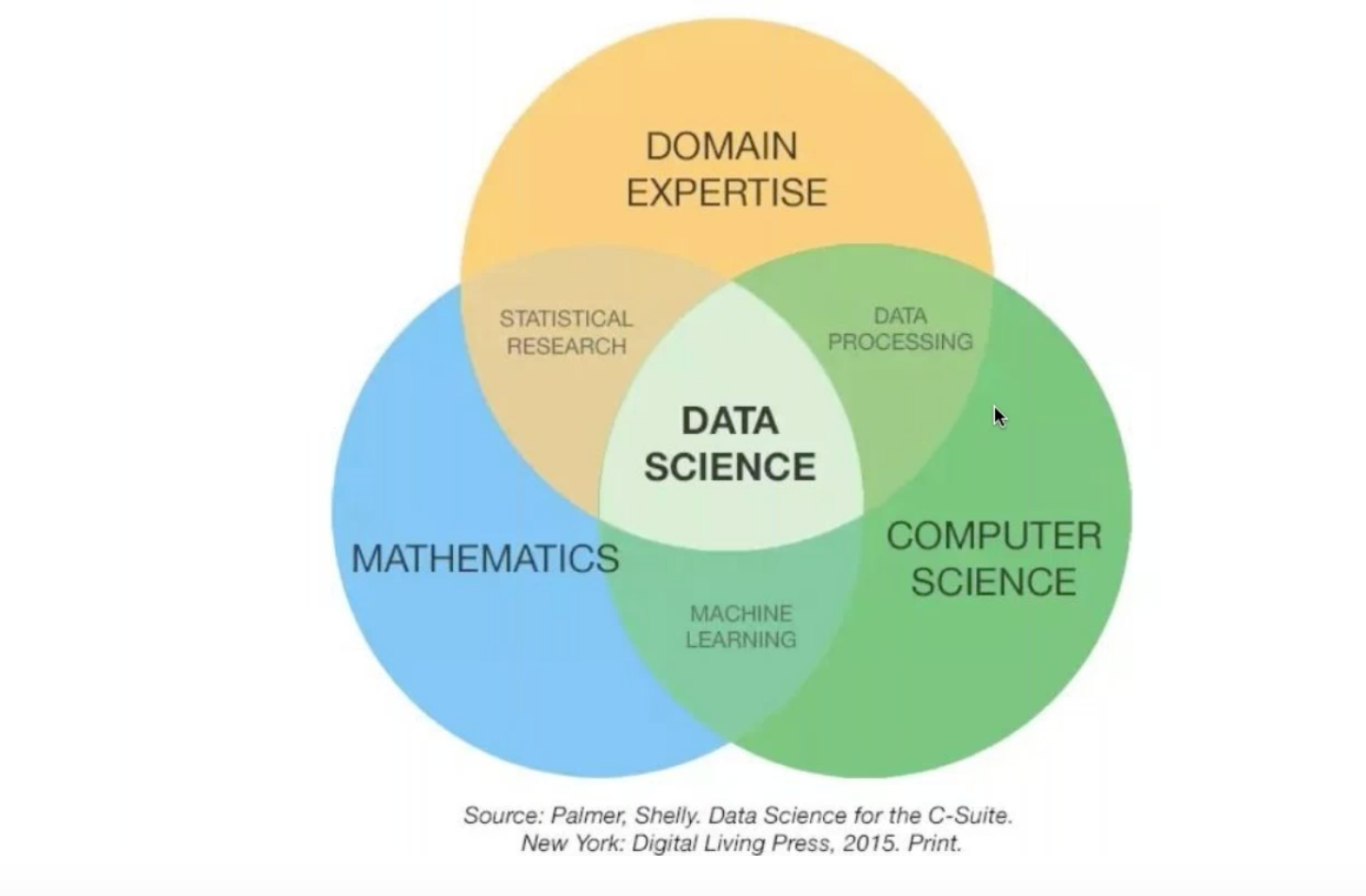
A new wave is cresting right now and it is about to break. The same way the internet changed everything, the next wave will change everything just as much.
This next wave is the AI Age. The AI age means data plus intelligence that can lean from the data. It means digital tools that possess the ability to think like humans. Digital tools that, for the first time, replace human intelligence.
A company that can harness this power can literally move as fast or faster than anything digital.
In 2017, the Harvard Business Review found that almost half of surveyed businesses are currently exploring use cases for AI technology. In the not-at-all-distant past AI technology was only available for large businesses, but now it is available for small businesses, too.

You can buy software, but at the end of the day, to win this thing you need to have the right team. Yeah, it's paradoxical maybe, but you need a team of humans in order to do AI right. The amount of data is growing exponentially every day. It’s impossible for a single leader to tackle it on their own.
If you are a business leader thinking about making some AI-focused hires, read on.
First AI Hire, Not So Fast
To build AI, you need to think about it like a pyramid. The base is your objective. Using the objective you build a strategy on top of it. Once you have the strategy, you have to make sure you have precisely the right team for that strategy. Then comes implementation, and then review.
A caveat: I have seen a number of companies, honestly I would estimate about 60 percent, start a AI project but then end up cancelling it because they don't see any result.
If your motivation is that you just feel like everybody is talking about how AI is the next thing, things probably won't go well for you. What often happens in this scenario is they run around and start hiring a lot of PhD's, but without a clear AI project and goals and questions in mind, it's like the blind leading the blind.
At the start, hiring somebody as a full time employee is not a good idea. If you're at the beginning of your company's AI journey, you don't want to build something when you don't know what to build for.
Start with your business objective. You've gotta be clear about this. What are you trying to improve? What's your expectation? What can AI actually help your business with? Most business owners don't know. If that's the case, I recommend hiring a consultant who can help you set the right objectives and questions—figure out the right problem. Here are some examples to get you thinking:
"I want to increase customer retention by 30 percent."
"I want to have more visibility."
"I want to be able to predict the future of this industry better."

I would advise taking things one step further, as well. If you have a customer facing interface (which is pretty much every single company nowadays), you typically have a customer to serve.
So, after you get your objective figured out, then ask your customers. If some of your objectives relate to increasing sales or retention, do customer interviews. If you hire a consultant, they can go and identify 5 or 10 or 20 customers and interview them to find out more about what their experience with your company has been like, and what they want going forward.
Once you have these aspects in place you will know your direction, where you wanna go, and you will have the map. Then you start building a team.
PhD in Artificial Intelligence Not Required
When a business leader thinks, "I need AI," the first thing people typically think is that they need to hire a lot of Math PhD's, but that is not necessary. It is important for you to know that most of the people you need to hire no longer need a PhD level education. You need good people, who have some other additional skills, who know about data, and know which AI 'appliance' to use.
What do I mean by AI 'appliance?' Nowadays, there are two types of AI. We can call them AI Practical and AI Research. Or, if you'd rather, AI 'Appliance' and AI 'Cutting Edge.' Most of the time, if you're not flying to Mars you don't need all the cutting edge stuff. You can use the AI appliance-type tools, and they are available.
You don't need to know everything, and neither do the people you hire. If you start there, it's quite simple.

The Truth About Data Science Jobs
What is required to build an AI solution? Three things.
Data
Data Infrastructure
Data Team
If you don't have the first two pieces in place, then you don't need AI, you need need an IT solution. You need a software developer and you need to start acquiring data. Data is crucial. I have seen people go ahead and hire a data scientist, but they don't have enough data for the data scientist to do anything with. It happens all the time, yet there is no point to it.
Once you have all the data figured out, and you are ready to implement AI, you need at least one data scientist. And a lot of people ask, well, what is data science? What does their skill set look like?
Something to consider is that these days there are plenty of people out there with "data scientist" on their resume, who are not truthfully data scientists. Over at the blog Teaching Code to Code, Marcin Mejran wrote about how "data science is more of a marketing term than a job description nowadays," along with a great, simple explainer of the different specific disciplines that are emerging in the field. If you're interested in learning more about the different disciplines with data science, I recommend checking it out.

So, What Do Data Scientists Do?
Data scientists are kind of a different breed, because they're considered a hybrid of multiple disciplines. They have to be able to understand math, pretty deep. And computer science too, so they will be able to implement the solution. And finally, the most important thing is being able to have a deep understanding of the specific industry. Every single data scientist probably has the first two—math and computer science, but it's having all three that make the data scientist.
Once you have a data scientist hired, then you can figure out where you are on the journey to becoming an AI-ready company. Based on where you're at, you can start with one data scientist hire and then grow, slowly adding more people as you continue in the evolution of your company.
I want to zero in for a moment on the difference between a data scientist and a data engineer. A data scientist is more like an artist, exploring data with an open and experimental approach. On the other hand, a data engineer is a rule follower, following certain steps. Many schools are training people to be data engineers, but they don't teach them what to do with a blank canvas. In fact, many programs only train people to use one algorithm. Guess what? If you hire a person who has been trained like that, they'll come to your company and tell you you need to use this one algorithm, because it's the only one they know, despite that there are currently about 100 algorithms out there and at least 7 or 8 that can be applied to any given problem. Choose wisely who you hire and make sure they are qualified and have an exploratory mindset.
My general guide for how to determine whether you have a wholesome data scientist sitting across the interview table from you is to look for a particular set of skills. To be really effective an AI expert must be proficient in these four areas:
Understanding abstract math and machine learning. They need to know statistics, probability, and all the tools of data science.
Programming ability. They had better be a good computer scientist. Do not hire somebody who doesn't know how to code.
Business skill and knowledge.
Being able to communicate well, being a people person.
Generalists for the Win
Aviral Bhatnager, a VC at Venture Highway recently tweeted: "In an uncertain world generalists have an unfair advantage." I could not agree more.

Because of Covid, the world has been rewritten all over again. Usually people say that being a specialist and focusing on a niche is the right way to do things. But now, with Covid and with AI, the generalist has the upper hand. You want your first AI-hire to be well-rounded.
Why You (Don't) Need a Chief Technology Officer
For hundreds of years it has worked for a company to be entirely run by marketing people or salespeople. That is no longer true.
Think about it this way: You have a Chief Financial Officer who focuses on money. Similarly, you need a Chief Data Officer (CDO) or Chief Technology Officer (CTO) who focuses on this side of things. Your CTO or CDO should be in the same room or even in a higher position than your CFO.
For most companies today that have a CTO, the CTO is not actually a technologist. Often, their role is more like...how would I describe it? Let's go with a "digital installer," for lack of a better term. They buy software and administer it. They "put the internet in there." They hardly ever develop anything. Their job is to maintain the status quo. They want to make sure the software is running, everybody is happy. They had a Blackberry for a really long time. This is not the right person to introduce innovation to your company.
For the next generation CTO, we have to come up with a new name. Because the mindset should be innovation first, I am thinking a title more like Chief Innovation Officer.
One tip I can offer is to look for people who have product management experience. Director of Products is a title to watch for on resumes. The Director of Products for a software company, even better.
In Conclusion
To recap: Make sure you have enough data to get started, and a clear objective. If you don't know what objectives to go after, hire a consultant to help you nail them down. Make sure you have future-thinking, data-driven people in your C-Suite. For your first hire, go for a data scientist who is a generalist and knows your industry. Build your team around them. And finally, enjoy the journey.
If you are at the stage where you want to talk with a consultant to figure out your business objectives and how AI fits in, my company, YVerge, is ready to help you.